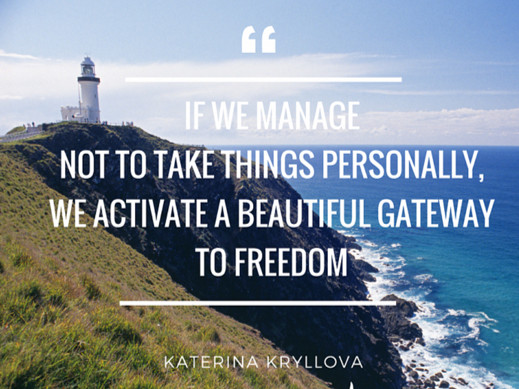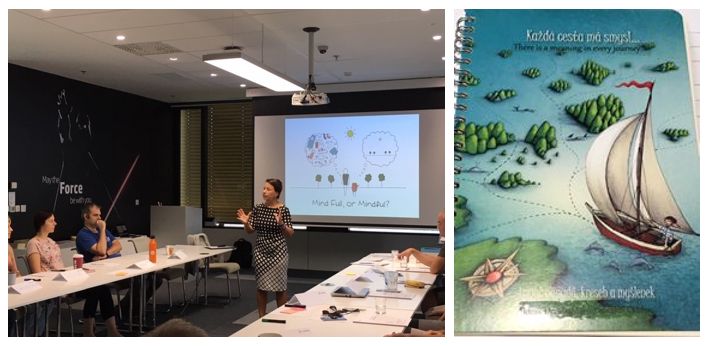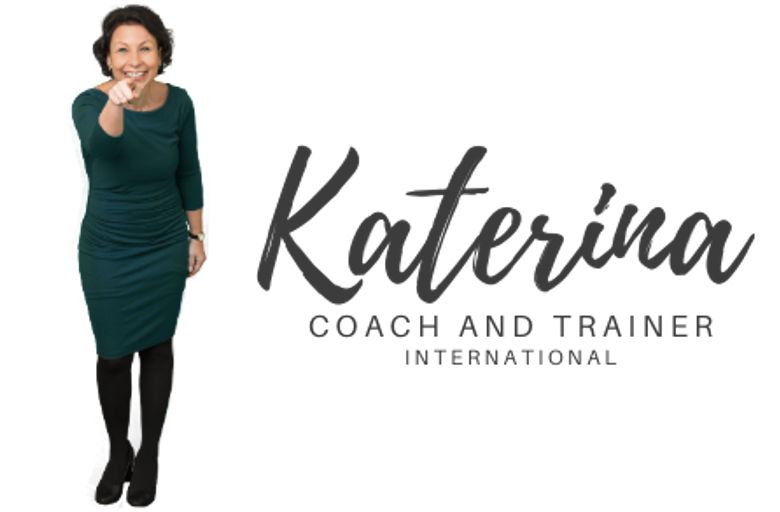Own your mind and life, says coach Katerina Kryllova
By Olga Mullen
This is an article written by Olga Mullen for the HP Life Magazine, December 2019.
We all, regardless of age, personality, or job description, face some level of mental discomfort from time to time, whether we speak about stress, bad time management, or simply anything that disrupts our balance. Sometimes we tend to disregard the symptoms and carry on. But there might be a remedy for getting our harmony back. Katerina Kryllova, a professional coach and trainer, has lectured two days of her popular session Practical Mindfulness in September. Participants left this course full of ideas on how to apply the knowledge into daily practice. Not all of us could attend her sessions. Particularly now, ahead of the hectic Christmas time, I ask Kateřina to share her expertise for HP Life Magazine.

Kateřino, how would you describe Practical Mindfulness?
“This workshop shows you that as much as you can go to the gym and make your body fit, you can do simple practices and make your mind fit in our hectic and demanding world. We took the deep and very complex mindfulness teachings, combined it with current findings of neuroscience, and offered a simple concept that requires a fairly small time investment and can significantly change the quality of your performance and your life. In a way, you could say it as the art of achieving more with less effort and stress. Some participants in this workshop focus more on improving their work performance, some go deeper and look at reclaiming their life back from the speed, requirements, and distractions of this world and have more joy, ease, and quality in relationships.”
Do you have any simple tips and tricks on how to stay mindful – either at work or in personal life?
This is not an easy question J. To me, the starting point is really seeing how busy and distracted we are on default. How many things we do on autopilot. Life does not have to be just slipping through our fingers. We can go back to living it fully. And what would be some easy tips?
Any time during the day, you can simply ask yourself,
“Am I present? Am I here?” And when you realize you were lost in your thinking, or in your doing, you can take a deep breath, become aware of your body, and pause. Look around, smell the flowers, feel the taste of your coffee, pay full attention to the person speaking to you, etc. This is how we can every now and then switch off the autopilot and become more present. This does not require any time. You can just become the observer of your presence.
Whenever you feel stressed and overwhelmed, stop for a moment, and take a deep breath.
Not quickly. I mean a real deep breath. Become aware of the tension in your shoulders, forehead, and maybe you even have clenched teeth. And ease the tension from your body. You may be surprised how easily you can do this and how much it helps.
Higher speed will do no good if your thinking is stressed out and cloudy.
Imagine it is like driving a car very quickly on a curvy road. You do your best to navigate and go fast, but your windows are all muddy, and your vision is not clear. You need a bit of space to clear your vision, calm your thinking, and then move forward. Then it will be a more mindful move.

Practical Mindfulness is not your first training here – could you tell us more about your work experience with HP?
I started working for you in 2015, and we’ve done regularly Assertiveness training sessions in Prague, Boeblingen, Bucharest, Barcelona, and Grenoble for the last four years. Every single session has been a pleasant experience for me, I’ve always felt that the HP culture and people deeply resonate with me. We’ve always had wonderful human encounters and valuable learnings, and HP soon became one of my favorite destinations. In January 2019, we added Practical Mindfulness, and I traveled to all these European sites and also did Assertiveness in Shanghai and Mindfulness in Singapore.
You have been lecturing at foreign HP sites – do you have any interesting observations?
There are many interesting things. One of my beloved observations with mindfulness is connected to one specific area – mindful eating. In the workshop, we talk about our habit of eating on autopilot and quickly without really digesting our food. And we practice mindful eating through lunch and chocolate meditation. That resonates very much with people in Prague, Germany, and Romania. French and Spanish people, on the other hand, say that this is what they practice on a daily basis. Mindful and joyful eating is already embedded in their culture.
My strongest observation, however, is something I realized when I was leaving the workshop in Singapore. I was leaving with a strong feeling that despite the fact we have some language barriers, different skin color, and many cultural differences, deep at our core, we are all the same. We all, as human beings, have very similar challenges and desires. We are much more alike than we are different. My international experience this year left me with a profound feeling of humanity and a strong human connection, and I was really touched by that.
What is your plan for the next training at the Prague site?
I do not know yet. Right now, we started preparations for next year. We will see

